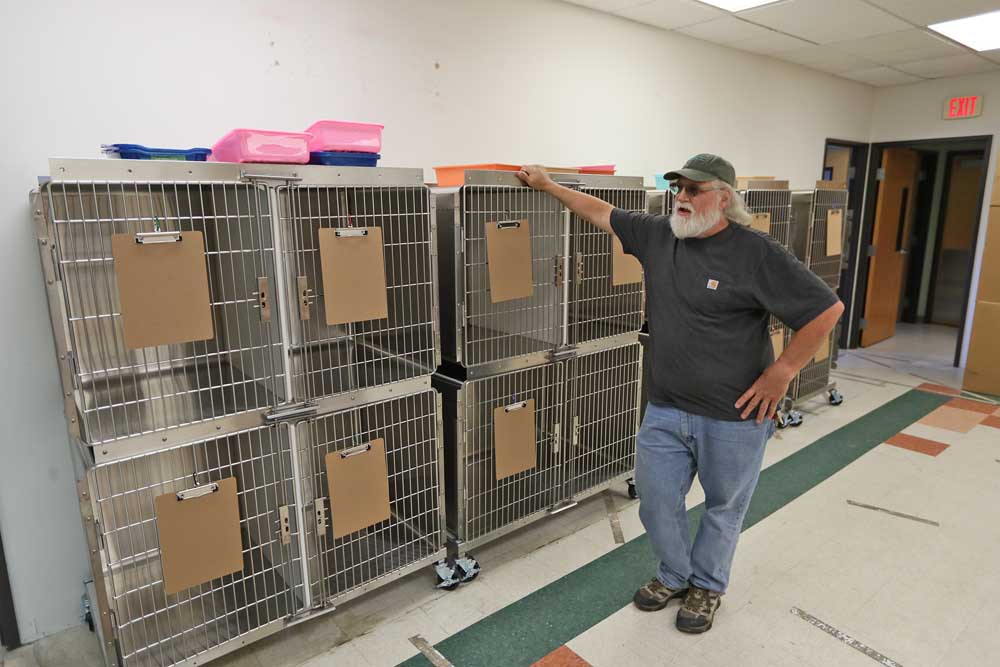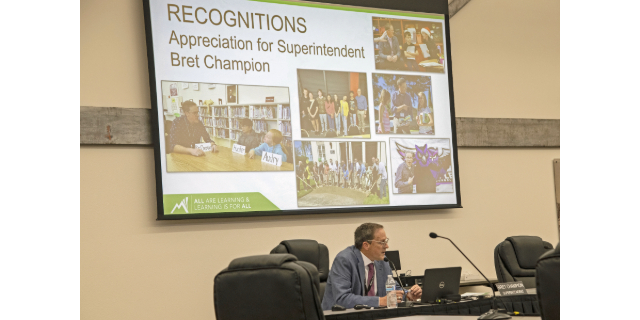Amid shortage of spay-neuter services, FOTAS to open affordable clinic in Medford
Published 4:00 pm Monday, June 10, 2024

- Bob Crowley, president of Friends of the Animals, stands inside a newly set up recovery area of the future FOTAS Community Spay and Neuter Clinic. Crowley said FOTAS hopes to have the facility open in the next three months.
The nonprofit Friends of the Animals will soon open a 5,200-square-foot clinic on Biddle Road that organizers say will meet a desperate regional shortage of affordable spay-neuter services.
FOTAS President Bob Crowley said last week that FOTAS recently signed a three-year lease on the structure at 3265 Biddle Road in Medford. The location was the original home of the Southern Oregon Veterinary Specialty Clinic until January 2023, when the SOVSC moved into a larger space farther north on Biddle in Central Point.
Much of the infrastructure and other apparatus SOVAC used at the facility was left in place, which helped FOTAS set up the new clinic, Crowley said.
FOTAS has operated a mobile spay-neuter clinic in recent years. Until November, the unit was parked and run out of the Jackson County animal shelter parking lot.
Founded in 1991 with the sole focus of supporting the county shelter, FOTAS has undergone significant change, including at the organizational level, over the past two years.
The relationship between Jackson County and FOTAS — which changed its name in December from Friends of the Animal Shelter to Friends of the Animals — shifted in early 2022 when the county made management changes at the shelter and enacted a policy, since reversed, prohibiting volunteers from working Mondays.
In addition, the county banned volunteer transport of animals and other key tasks. County officials cited liability issues, a need to allow staff training and veterinary procedures to take place one day per week, and the fact that county staff said they needed time to conduct a feasibility study to determine operational costs and replacement options for the shelter, which was built in 1961.
Volunteers protested the changes — dogs being left in kennels for long stretches, in particular — and began attending weekly county Board of Commissioners meetings to voice concerns. Volunteers presented a 1,200-signature petition last June, urging the county to reverse course.
Eight months later, FOTAS executive director Sky Loos — who later resigned from her position — said the county had withdrawn the no-Mondays policy beginning in March. During an animal shelter forum, hosted by community members in April, people voiced concerns on a range of topics, from the shortage of spay and neuter services, to the care of stray animals in the county, to county officials’ plans to solicit feedback on an animal services district.
Crowley attended the forum, announcing for the first time that his organization had identified a likely clinic location. Along with the name change, FOTAS had announced in December that it was expanding its mission to focus on animal rescuing, fostering and spaying and neutering outside the county shelter.
Crowley said Thursday he was eager to see FOTAS’ goal of increasing access to affordable spay-neuter services come to fruition.
“We were at the shelter before and did mostly shelter animals. We needed to move it from the shelter because we couldn’t really do community animals while we were on site,” Crowley said during a tour of the new clinic location on Thursday.
“They have all this liability stuff that they need to think about.”
Crowley said he felt FOTAS’ working relationship with the county has “improved quite a bit” since he became the nonprofit’s president in December.
“We got Mondays back, so that was really good,” he said.
A few weeks ago, FOTAS cohosted its first event with the county in two or three years.
“We’re back to being more on the same page, I think,” he said.
Crowley said he hopes to see the spay-neuter clinic open in the next three months.
Regionally, spay and neuter services cost around $600 to $700, “some even more than that,” he said. Open just two to three times per month before moving from the shelter location, the unit provided spay or neuter services for 533 dogs and cats in the year and a half leading up to November.
He anticipated serving community members currently faced with driving to Klamath, northern California or Roseburg for spay-and-neuter services. While FOTAS does not plan to expand clinic services in the near future, Crowley said microchipping and vaccinations will likely be provided during spay-neuter appointments.
“Our goal is to be affordable. We’re going to have a sliding scale” — for example, different scales for pet owners who are low-income or who adopted rescues, he said.
FOTAS had given grants to rescue groups and community members to seek spay-and-neuter services elsewhere. Being able to do the operation at its own clinic will free up FOTAS funding.
“Hopefully, now, instead of giving grant money to pay for people to go get their dogs spayed or neutered, we can just provide the services either greatly discounted or for free, depending on the situation,” he said.
If FOTAS can hire employees — there’s a veterinary technician shortage — and sort out other details, Crowley said he hopes the new space will be open Monday through Friday.
“Everybody, everywhere I’ve talked to, including all the vets, are desperate for spay-and-neuter. We can’t get this open fast enough,” he said.
As soon as the mobile spay-neuter unit appeared at the new clinic location, pet owners began stopping by, he said.
“This past weekend we spayed and neutered 26 animals parked right here,” he said.
Earlier in the week, “we were here setting up and I had somebody pull up and say, ‘Can we spay our dog right now?'”
“The need is obviously there,” he said.







